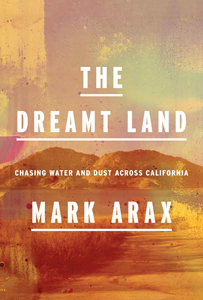 Mark Arax, The Dreamt Land; Chasing Water and Dust Across California (New York: Knopf, 2019), 562pp.
Mark Arax, The Dreamt Land; Chasing Water and Dust Across California (New York: Knopf, 2019), 562pp.
Since Mark Arax was born into a third generation of Armenian farmers in Fresno, California's population has quadrupled to forty million people. No wonder that for the title of his previous book he borrowed a phrase from Theodore Roosevelt, who famously said: "When I am in California, I am not in the West, I am west of the West." That is, California is not just a state, it's a place, writes Richard Rayner of the LA Times, where "experience and social experiment happen in ways that are both unto themselves and constantly surprising."
Nowhere is that more true than with what Arax calls "the most effective of California's elixirs: water." Water from the snow melts flowing down Mount Shasta from the north and the Sierras from the east. Water from thousands of wells drilled into ancient aquifers and pumped to the surface. Water from rivers that have been re-routed. Water from man made reservoirs, and from a vast network of complicated plumbing — 700 miles of canals, plus ditches, dams, levees, and pipes. Water controlled by state and federal agencies, bought and sold by multi-national conglomerates, and even stolen from one's neighbor. And in the right season, water from rainfall. California's many manipulations of water have been nothing less than "the greatest human alteration of a physical environment in history" (189).
And none of it has been sufficient for California's agricultural appetites, especially in the 450-mile stretch of the Central Valley. About eighty percent of California's water goes to agriculture. The message of Arax's nuanced book is simple: California's complicated love affair with water is unsustainable. Already there are widespread problems with "subsidence" — that is, land that is sinking (as much as thirty feet in fifty years), the poisoning of ground water by fertilizers, suburbs that demand water where it does not exist, urban centers like LA and San Diego that have no independent water of their own, etc.
There are many actors in this 150-year-old saga. Arax's sprawling and meticulously researched book lets everyone have their say — billionaire farmers who live in Beverly Hills, environmentalists, multi-generational farming families like his own, state and federal officials, scientists, water directors, the Mexican workers without whom none of the profits would be possible, etc. "It might be best to leave the misunderstanding(s) right there," he writes, and "let each tribe preach its sermon, creed and rant to its own, for no book, long or short, could ever hope to bring peace to California's water wars" (497). But one thing remains certain: California's attempted "negation of nature" cannot continue at its current pace.
Dan Clendenin: dan@journeywithjesus.net


